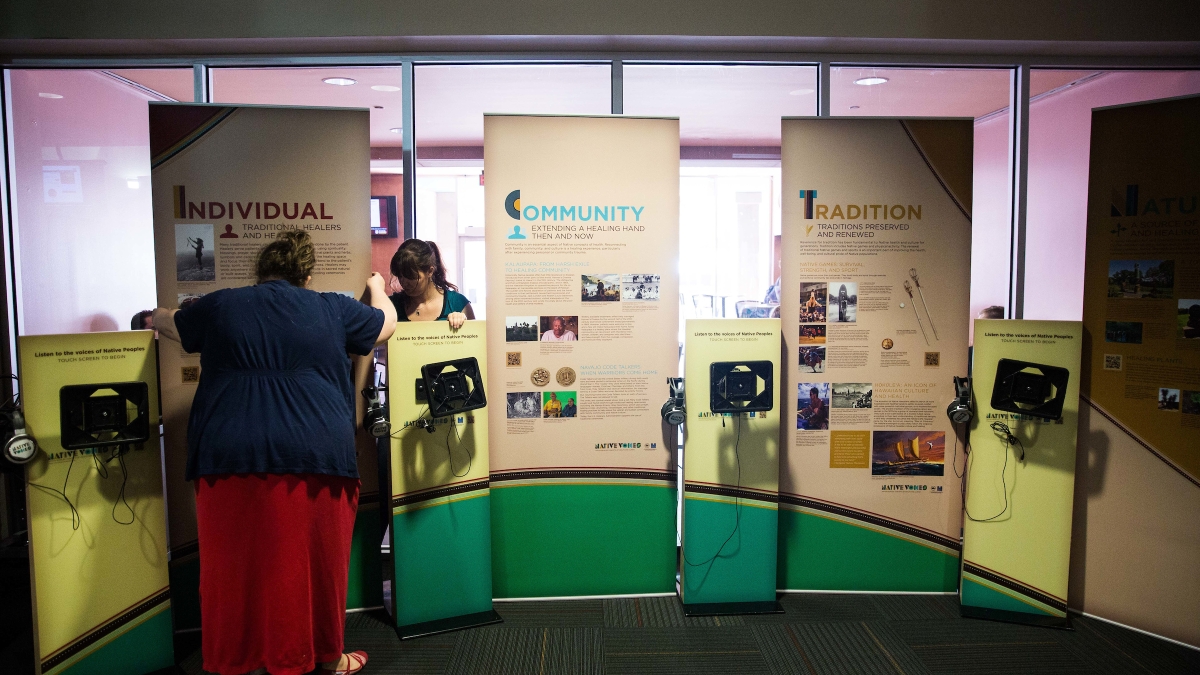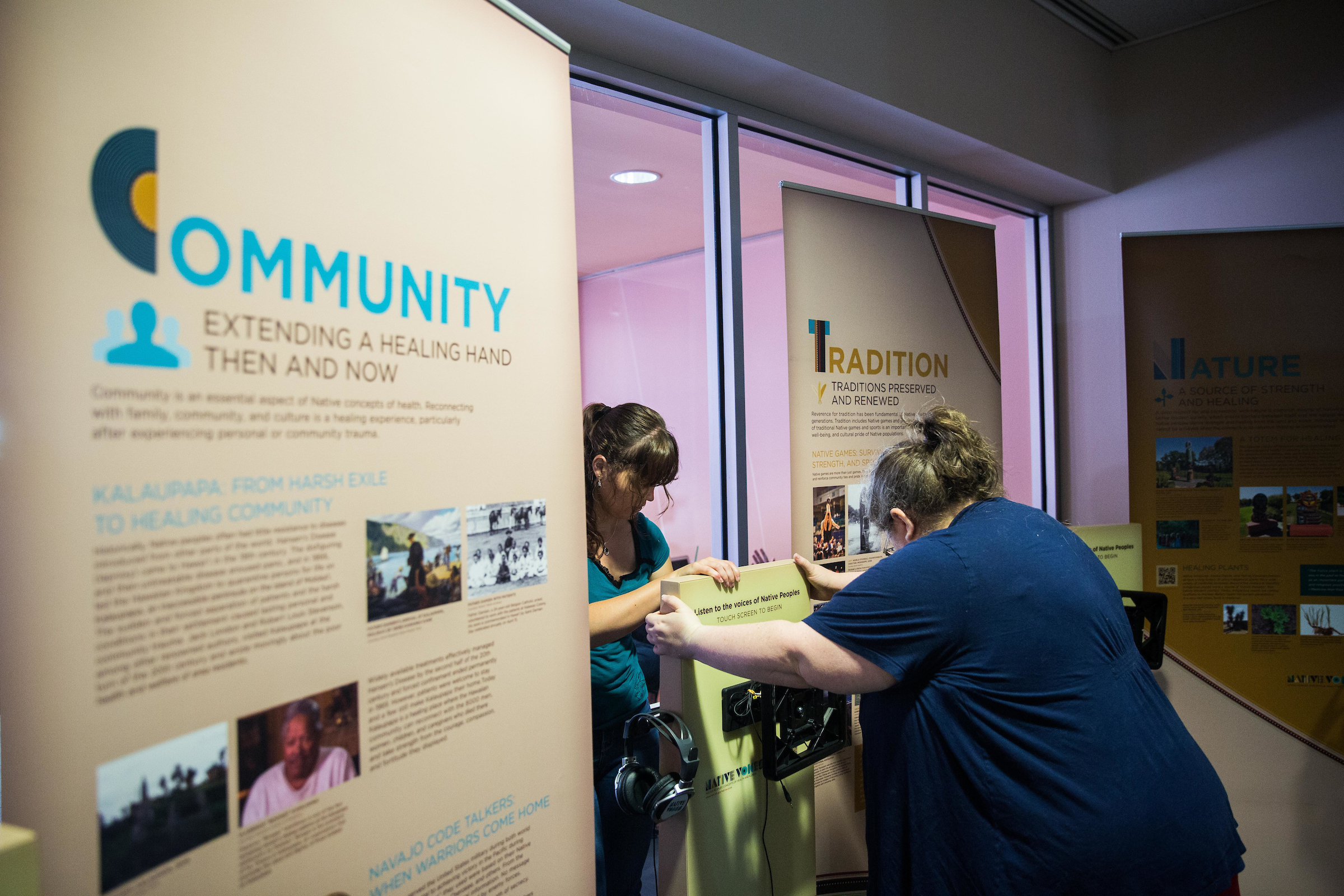ASU exhibit takes long view of Native well-being
In latest American Indian health-care move, interactive display examines connection between individual, community

An interactive exhibit installed Thursday at Arizona State’s Hayden Library examines the history, culture and tradition of indigenous medicine to help viewers explore Native American health from a wide-ranging perspective that includes spiritual, social and community well-being.
“Native Voices: Native Peoples’ Concepts of Health and Illness,” on display through late October, looks at the connection between wellness, illness and cultural life through a combination of videos, interviews and images.
It represents the latest of ASU’s efforts to focus on Native health, which special advisor Bryan McKinley Jones Brayboy says “must be rethought to reflect the idea that we are interested in American Indian well-being. This includes not only a focus on the well-being of individuals, but communities as well.”
Brayboy, President’s Professor, director of the Center for Indian Education and ASU’s special adviser to the president on American Indian Affairs, continued: “The focus on physical health, devoid of mental and spiritual well-being is stultifying and limited. This exhibit helps us move forward in important ways.”
Other ASU efforts to support and serve American Indian health care needs in and around Arizona include:
- Several ongoing projects related to Native youth and substance abuse at the Southwest Interdisciplinary Research Center.
- A push to increase the number of indigenous nursing students at ASU through American Indian Students United for Nursing.
- Efforts to promote, mentor and support Native American nurses and others serving Native people through the Native American Nursing Association.
- Social work through the Office of American Indian Projects, which has multiple health professionals on its advisory board.
The new exhibit shares stories that convey how Native people use both traditional and modern methods to enhance their lives, presenting an inspiring account of renaissance, recovery and self-determination.
A public reception, hosted by the Labriola National American Indian Data Center and ASU’s Center for Indian Education, has been scheduled for 4 p.m. Sept. 20 in the Hayden Library, Concourse Level, Room C55.
Graduate student Kelsey Hinesley (left) and ASU Libraries design strategist Amy Watson (right) work together to set up “Native Voices: Native Peoples’ Concepts of Health and Illness,” which will be on display at the Hayden Library through October. Photo by Deanna Dent/ASU Now
Angela Gonzales, an associate professor of women and gender studies and justice and social inquiry in the School of Social Transformation, will deliver the keynote speech.
“From an indigenous perspective, the very concept of health is not something focused on the physical well-being of an individual, but is instead understood as it encompasses the social, cultural and spiritual well-being of the whole community,” Gonzales said. “Appreciating the holistic understanding of health is essential not only for the planning and delivery of effective health care, but for developing policies and programs aimed at improving individual and community health.”
Produced by the National Library of Medicine, the interactive exhibition is made up of six free-standing banners, each with a specific theme. Tablet computers, headphones and tool kits provide videos, images and interviews with more than 100 tribal leaders, healers, physicians and educators.
The participants describe how the health of American Indians is tied to community, the land and spirit, and the effects of epidemics, federal legislation, the loss of land and the relationship of traditional healing and Western medicine in Native communities.
ASU professor Tennille Marley said she hopes the exhibit will show how colonization has had long-term detrimental health effects on indigenous people, which is part of her research.
“Colonization introduced foods such as sugar and flour, separated us from our gardens and food source and has negatively affected Native American health since the 1800s,” said Marley, an assistant professor of American Indian Studies and a faculty research affiliate with the Southwest Interdisciplinary Research Center.
Marley said the introduction of processed foods, which have been reinforced through government policies and programs, has contributed to soaring epidemics such as obesity, diabetes, heart disease, dementia and Alzheimer’s.
ASU has worked for a year to bring the exhibit to Tempe said Joyce Martin, associate librarian and curator of the Labriola National American Indian Data Center.
“It’s very important the Southwest be represented in this national exhibit,” Martin said. “It was created in Washington D.C. and has traveled to other parts of the country. We have a long indigenous history here and it will have great meaning here.”
The exhibition will up in the library’s concourse until Oct. 26.
Top photo by Deanna Dent/ASU Now.
